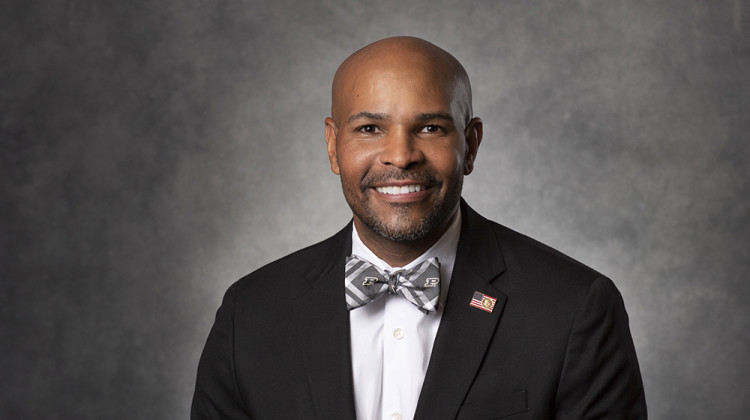
Former Surgeon General Jerome Adams is speaking out against Health Secretary RFK Jr.’s statements on vaccines.
John Underwood / Purdue UniversityThere is growing confusion about who should — and can — get a vaccine for COVID-19 as advice from the federal government conflicts with that of some health experts.
Former Surgeon General Jerome Adams worked in the first Trump administration when the COVID vaccine was being developed.
WFYI's Benjamin Thorp spoke with Adams, who is also the executive director of Health Equity Initiatives at Purdue University, about the changes and vaccine skepticism coming from the health secretary, RFK Jr.
The following transcript has been edited for style and clarity.
Benjamin Thorp: Talk about what you make of the FDA's new COVID vaccine guidance on who is eligible, namely that only those with a significant health complication or 65 and older need the vaccine. What do these changes mean, and how should people understand some of those shifts?
Jerome Adams: Well, the changes that we've seen from the FDA are changes that we've long suspected would be coming from an administration where RFK is in charge of health policy. We know he is a COVID-19 vaccine skeptic, in addition to being a skeptic of other vaccines.
What the public needs to understand is that, unfortunately, 71% of adults in America have one or more risk factors for a negative outcome from COVID. That is why we had the Universal Recommendation here in the United States.
Thorp: How do people now access a COVID-19 vaccine, particularly those who aren't going to fall in the older-than-65 age group? Can I go to the pharmacy still, just to get a vaccine?
Adams: Well, this is one of the things that I have challenged FDA commissioner Marty Makary and RFK Jr. on — they insist that 100% of people who choose a vaccine can get one. We know that's just false, because HHS, by its own data, 11% of the country doesn't have health insurance and doesn't have access to a primary care physician.
And with the new guidance, they've set it up such that you need to have a consultation with a primary care provider. We don't know whether that means you need to get a prescription, whether or not you're going to have to self-attest.
In many cases, this is going to be determined by pharmacies, by doctors' offices, and you're still going to have to, in many cases, have a doctor willing to sign off for you to get this vaccine. So there are many new barriers that have been created.
Thorp: Health Secretary RFK Jr. has continued to undermine CDC data and call into question how many lives the COVID-19 vaccine has saved. He's installed skeptics to guide vaccine policy and canceled grants for vaccine development. What do you make of his perspective on vaccines, and what is this going to mean for people's health?
Adams: Well, number one, leaders have a responsibility to inform the public, not inflame the public, and what RFK Jr. is doing will undoubtedly make us sicker, not safer.
And so medical and public health experts, including members of Congress, have warned that RFK Jr.'s words and actions are increasing vaccine hesitancy in real time, they're decreasing vaccine access, especially in underserved communities, and again, they are going to make us sicker as a country, not safer as a country.
Thorp: We've seen places like the American Academy of Pediatrics release guidance that conflicts with the government's recommendations. We're also seeing states like California, Washington, and Oregon band together to release their own vaccine recommendations. Where should people go for their health information?
Adams: Well, you bring up a good point. RFK has pledged to bring truth, transparency, and trust back to HHS. But objectively, we've seen truth, transparency, and trust drop. So what does that mean for individuals at the ground level?
Continue to talk to and trust the person who you would trust to take care of any other issue that you or your children have — your primary care physician, your pediatrician. Go to them, ask them what they think, what their societies are recommending.
Don't go to social media, and unfortunately, and it pains me to say this, you can no longer go to the federal government, to the Department of Health and Human Services, to the CDC, or the FDA, because the information that they are putting out is much more ideological than it is based in science.
Thorp: Thank you so much for taking the time to talk to me. I really appreciate it.
Indiana has not released new vaccine guidance as the federal government has moved to change guidance for vaccines.
Contact Health Reporter Benjamin Thorp at bthorp@wfyi.org.
 DONATE
DONATE








 Support WFYI. We can't do it without you.
Support WFYI. We can't do it without you.